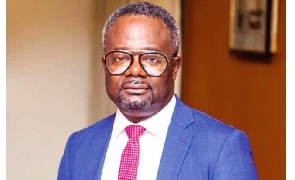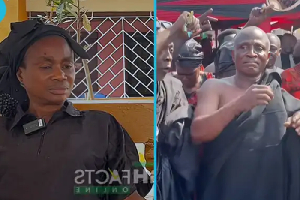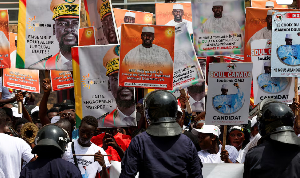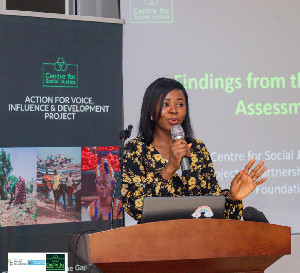By Kofi Ata, Cambridge, UK March 7, 2015
In recent weeks, freedom of religion has become a contestable subject hotly debated in Ghana after some Muslim Youth in Western Region demonstrated against alleged religious discrimination against their compatriots in Christian Senior High Schools. In response to their demands to allow such students the freedom to practise their faith, allow female students to cover their heads and not be compelled to attend Christian prayers, etc, President Mahama hurriedly issued a presidential edict, followed by further contradictory directives from the Ministry of Education. Catholic Bishops also issued instructions to heads of Catholic Schools to adhere to the Catholic ethos in their schools. In the midst of such confusion, a citizen has filed a petition at the Supreme Court to seek clarification on the right to religious freedom guaranteed in the 1992 Constitution. This article is a contribution to the debate but also to warn Ghana and Ghanaians that, the right to religious freedom is not sacrosanct but a qualified right. The country risks pandering to Islamic fundamentalism should religious freedom be treated as an unqualified right and its practices not managed for the good of society.
I have always known Ghana to be a secular society with different faiths able to practise freely, not interfering in matters of the state and where religion and politics are separate. However, I am also aware that Ghana is Christian country and let me explain what I meant by that before I am accused of contradicting myself. Often, people assume a Christian country is determined by the majority faiths being practised by way of numbers, the number of people who bear Christian names or those who go to church or attend mass on Sundays. No, that is not what I mean, though by such definitions Ghana qualifies to be a Christian.
A country is Christian if her culture, customs and values are based on Judeo-Christian ethos of western liberal democracy and not the number of Sunday worshippers or the proportion of the population that bear Christian names. Ghana’s laws and governance system have been and are still based on western democracy. For example, until recently, public holidays in Ghana were based on the Christian calendar (Saturdays and Sundays as rest days, Christmas, Good Friday, Easter holidays, the school and working week of Monday to Friday, etc.). Whether during multiparty democracy or military dictatorship, the laws of the land are based on some form of western democracy’s concept of rule of law even if imperfect during military dictatorships. The first, second, third and fourth republican constitutions were all based on principles of western liberal democracies. That is what I meant by Ghana being a Christian country.
Despite being a Christian country, the people have coexisted peacefully with other faiths, including Ghanaian or African traditional religious practices since the introduction of foreign religions, particularly Christianity and Islam into Ghana. In fact, it would not be an understatement to say that, Ghana has had one of the most liberal religious practices and tolerance in the world. For example, as a child in primary school, I had the unique experience of moving from a Christian majority town to a Muslim dominated one by numbers. The only marked difference I now remember was that whilst most faith practising people in the town had two names, Muslim school children had three (at school). That was because Muslim children were given Christian (first) names followed by their fathers’ name at school as all other children. Therefore, they could be called by their school names which teachers used or by their school, Muslim or birth names interchangeably by their school mates. At home, their fathers often called them by their Muslim names, whilst their mothers and non Muslim adults called them by their birth names. For example, one of my friends and class mates was called Kwasi Otu, his birth name, Ibrahim as Muslim name and John Barnes as his school name. Those of us who were not Muslims called him by his birth name at home and John Barnes at school. The Muslim women of the town covered their hair only when they were on their way to and from the Mosque, though few, such as family members of the Muslim leaders covered their hair more often.
I also had the privilege of attending Catholic Boys’ Secondary Schools for both “O” and “A” Levels in the 70s where there were non-Catholic students, including Muslims. At St Augustine’s in Cape Coast, though we were expected to attend morning mass it was not compulsory. However, Sunday mass was a must for all Catholic students whilst non Catholic students attended a non denominational Christian service led by leading members of the Scripture Union at the Music Hall (sometimes, visiting pastors from town came to officiate their church services). Muslims students were free to attend both but not required. Since all dormitories were locked during Sunday mass/church services, Muslim students went to study in the classrooms. They could not be seen loitering around the school compound. Some asked permission and were allowed to attend Friday prayers in town but had to miss some lessons so it was not regular. I believe that was the same at St Peter’s at Kwawu-Nkwatia, where I did my Sixth Form.
Though Religion was not offered as a subject at both “O” and “A” Levels at Augustine’s the weekly Christian based Religious Education lesson was compulsory from Form One to Upper Six irrespective of one’s faith. In fact, I do remember a Muslim classmate saying that the study of Christian religion gave him an advantage over us because he had the benefit of knowing both and never complained that he was being coerced, compelled or forced to study the Christian faith as a Muslim. All students also attended the weekly school assembly and we recited the Lord’s Prayer together.
It appears in Ghana today, the peaceful coexistence of different faiths and the liberal interfaith or religious practices are no longer the case. I also had friends at and visited girls’ and mixed schools such as Holy Child, Wesley Girls, Aggrey Memorial and Ghana National all in Cape Coast. We also mixed during inter schools sports/games but I never saw female Muslim students covering their heads as a mark of their faith or religious practice, neither did I hear about Muslim students complaining about the Christian ethos and practices some of these schools.
This new development of religious freedom and the supposed rights to practice one’s faith at school in Ghana is very disturbing for a number of reasons. First, and as I have already stated above, freedom of religion is a qualified right even under international law. This is because there are some excesses or extremism when it comes to religion such that if not restricted, controlled and managed could endanger peace and security. It means that, the right to religious freedom is subject to certain conditions that must be prescribed by society, governments and institutions. However, any prescriptions or restrictions must be rational, reasonable and what is acceptable in a free and democratic society.
Schools are institutions of learning and must have rules and regulations such as dress code, behaviour and religious practices. These must be rational, reasonable and what are expected in a free and democratic society. They must also be made accessible to all members and potential members of the institution. In some cases prior to being accepted into the institution, one must agree and sign up to be of good behaviour and abide by the rules and regulations of the institution. For these reasons, there is no such thing as absolute religious freedom in schools when one becomes a member of a school. That is why Christian students are at liberty to attend church services on Sundays or not to when at home on holidays but they do not have that choice whilst at Christian boarding school.
When a Rastafarian student who took his school to court for religious discrimination here in the UK for the school insisting that he kept his hair short and not in long dreadlocks, the school successfully argued that wearing short hair was part of the dress code for all students and the student lost the case. The court ruled that the school had the right to impose a dress code on all students and an exception could cause more harm than good. Moreover, the student had the choice to attend another school that may allow him to wear long dreadlocks. He compared himself with Sikh students who were allowed to wear turbans but this was rejected by the court because turbans were neatly worn and the hair was not exposed.
All religious or faiths are oppressive to women, minorities, the weak and vulnerable in society. For this reason, unrestricted, uncontrolled, unmanaged and a free range religious freedoms and practices would be dangerous to society. This is particularly so with the Islamic faith that continues to adhere to practise religious edicts as if society had remained at a standstill since time immemorial.
There is no doubt that whilst society in general and Christianity are becoming more tolerant, it is also a fact that Islam is becoming more radical and fundamentalist across the globe. Fundamentalism starts on a very low scale with individuals observing certain Islamic dress codes such as men keeping beards and women wearing the hijab. Whilst Muslim men have the freedom of choice either to wear a beard or shave it, most Muslim women do not have such options. The women are coerced, compelled or even forced by men to cover up. For example, I have had the chance of speaking to young UK born and university educated female Muslims of Bangladeshi and Pakistani origins who previously did not wear the jihab but started wearing them later. Most, if not all, told me privately that they had to do it because their fathers wanted them to marry within their faith, women who covered up were regarded as good Muslims by men and suitable for marriage, yet many of them publicly claim that it was their choice to cover up. In reality they have coerced or compelled by the need to marry from within the faith to cover up, condition forced on them by men.
Again, all religious codes such as dressing were written and enforced by men but in the case of Islam, the partial or complete covering up of the female body has nothing to do with being a good Muslim but everything to do with protecting the indiscipline and uncontrollable sexual behaviour of men. It is not about protecting women from attacks. Have Muslims women questioned why most Muslim men cover their faces except their eyes when committing heinous crimes such as beheading hostages? Why do Muslim men dress up in burka when they escape from the law after committing crimes? Is that not insulting to Muslim women the burka?
This should be a warning to President Mahama, his government and Ghana that giving room to religious fundamentalism under the guise of the unrestricted right to practise one’s faith wherever, however and whenever has no place in modern liberal democracy. Today, they come asking to wear hijab at school, tomorrow, it be the right to grow their beard whilst still at senior high school, then the right to wear burka, etc. Where would it stop and by the time you say no to the next demand, force would be used to demand such not existent right to practice their religion. That would be the beginning of “book harm” style demands.
For example, would government accept it if these same Muslim students demand that their right to practice their faith is violated by being compelled to attend school on Fridays and therefore they want the freedom not to attend lessons and take exams on Fridays? That would be the next demand under the supposedly unqualified religious freedom. I understand University of Ghana has been compelled by such demand by Muslim students to now hold exams seven days a week but regular lectures are still from Monday to Friday.
Such unfretted freedoms or rights and those behind them are deluded. They would not stop there and would demand more and more. The right to religious freedom guaranteed in the 1992 Constitution is not absolute but a qualified right. Schools and other institutions have the right under the same constitution to regulate the behaviour of all students under their care, whether state funded, Christian or not. Christian and Muslim students have coexisted with each other in religious schools for decades without these demands. If it’s not broken, do not fix it. We must be tolerant but if Muslims want to go to Christian schools, then, they must give and take, they cannot have it both ways. They should be free to attend the mosque on Fridays but cannot stop academic work on Fridays or insist on their own dress code. That is, “when you are in Rome, be yourself but remember that you are in Rome”. In other words, you can wear your ‘kaba’ or ‘batakri’ during winter in Rome but remember to wear winter jacket on top of it (provided you avoid the Asiedu Nketia Germany fashion).
Ghana will be sleepwalking into religious fundamentalism if the right to religious freedom is practised as an absolute rather than a qualified right.
Kofi Ata, Cambridge, UK
Opinions of Monday, 9 March 2015
Columnist: Ata, Kofi














